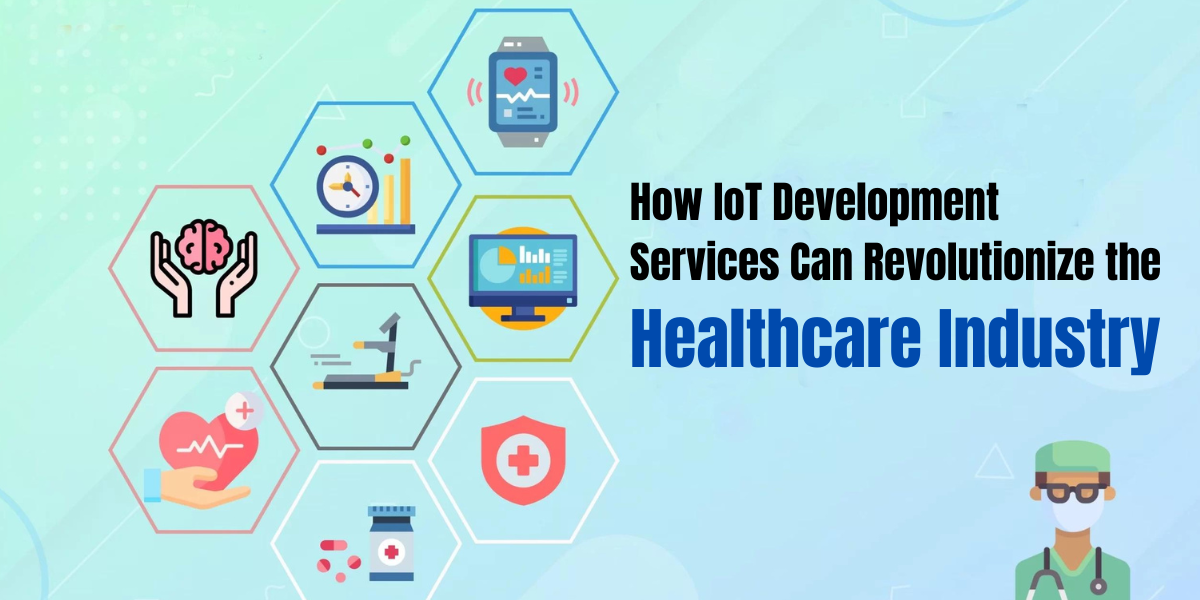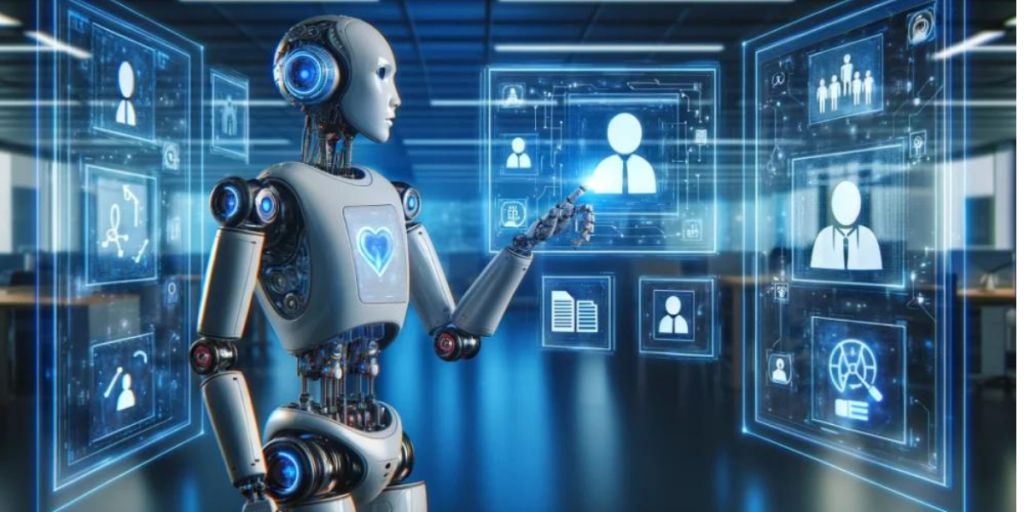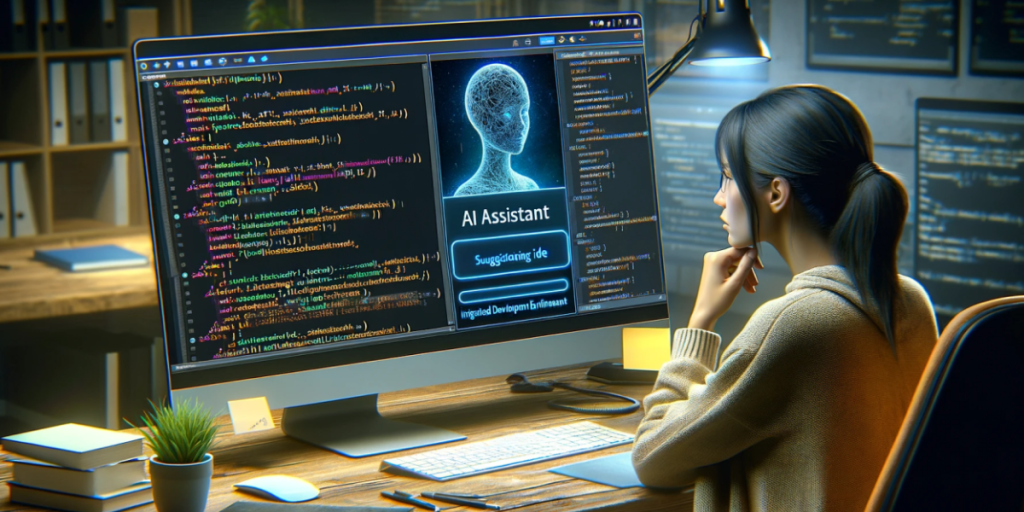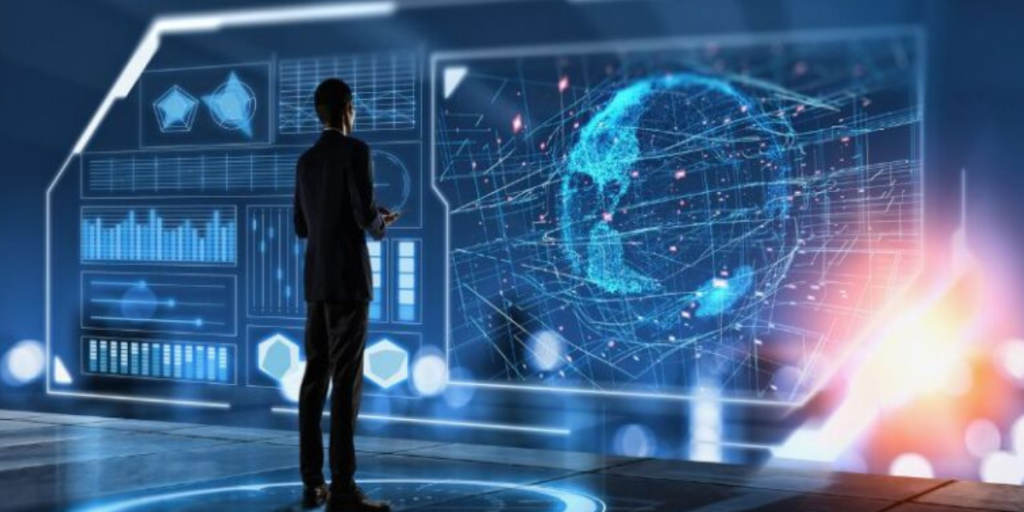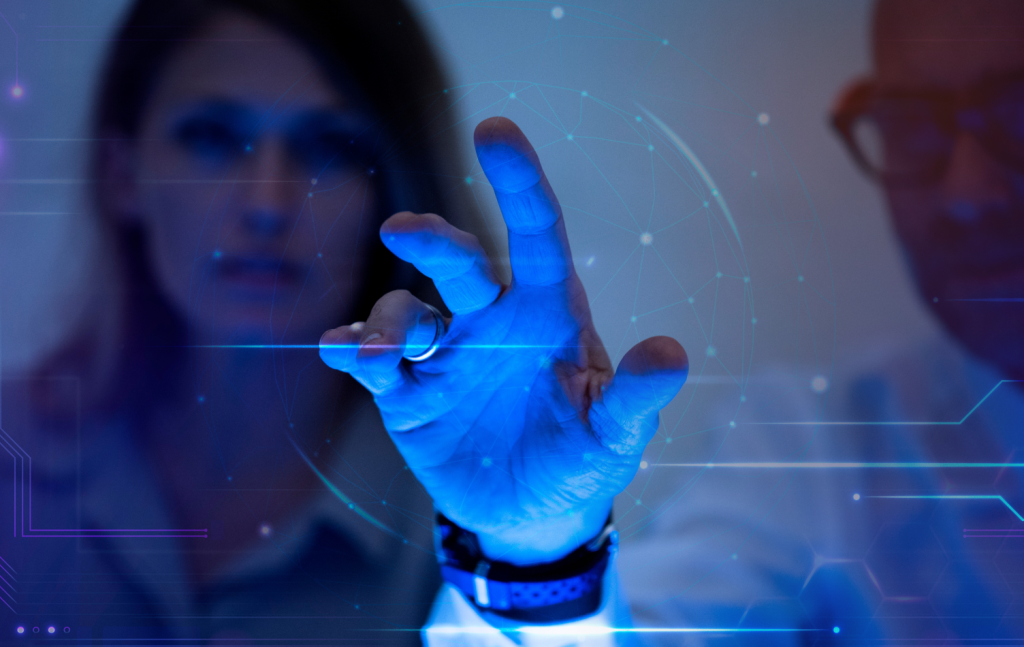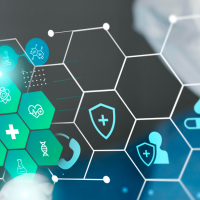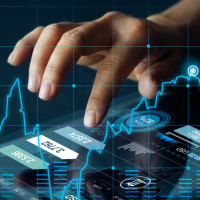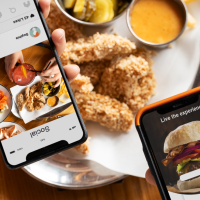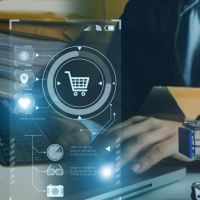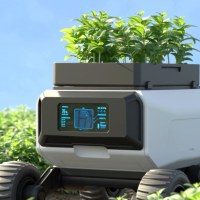The introduction of Internet of Things (IoT) technology in healthcare systems has revolutionized treatments, patient care, and medical research. IoT development services refers to an interconnected system, and physical devices are infused with sensors and programs that gather and exchange information. For healthcare, IoT enables remote patient surveillance, improving healthcare facilities’ efficacy and encouraging individualized treatments. IoT is frequently referenced by healthcare professionals as IoMT or the Internet of Medical Things.
The impact of Internet Of Things Development Services on healthcare has increased exponentially. IoT applications in healthcare have become commonplace worldwide, with benefits ranging from better machine control to remote medical aid. The latest technology advances rapidly and can save lives by enabling speedy disease diagnosis and determining the most suitable medical options for patients.
In this post, we will examine how IoT has changed healthcare and the advantages, use cases, and issues of implementing IoT for healthcare. Without further delay, we’ll get going.
What Is The Iot And Why Is It So Important For Healthcare?
The Internet of Things, or IoT for short, refers to an interconnected system of physical objects like cars and appliances equipped with sensors or software that enables them to gather and exchange data. Devices connected to the internet form an IoT system that enables devices to interact and exchange messages among themselves and with other internet-enabled devices and services. One can think of an IoT health facility as a collection of all-encompassing computing that focuses on outside actions.
Therefore, in healthcare, IoT-based systems can collect information about patients and receive input from medical and doctor experts. Continuous glucose monitoring in insulin pens is an excellent instance of this. Each of these devices can interact with each other and perform necessary actions that could provide prompt assistance to save a life. When the data has been gathered, the IoT medical device will transmit this vital data to the cloud to allow doctors to respond to the information. Based on this, IoT could enhance patients’ health, the productivity of healthcare employees, and the workflow of hospitals.
Where Does IoT Fit In Healthcare?
While IoT technology evolves as it does, it is becoming more and more advanced. IoMT (Internet of Medical Things) has revolutionized healthcare by improving medical health outcomes while connecting physicians and their patients online. Internet of Medical Things refers to devices connected to the internet that gather real-time healthcare data in near real-time. It has become one of the primary uses of IoT within healthcare settings today. It’s one of the most essential uses of IoT for healthcare. It is positively impacting healthcare and may even provide solutions to medical issues.
In addition, IoMT stops any future illnesses. However, it could also treat those who have already suffered from it. This technology is being integrated into wearables to monitor patients’ health.The Internet of Medical Things has separated segments for every health issue the medical industry faces.
On-Body Segment
It focuses on the health of customers’ devices and medical wearables. Fitbit, Apple Watch, and Amazfit Smartwatches are the most popular products in this category.
In-Home Segment
The goal is to provide an individual with private health tracking solutions. This includes personal emergency response systems (PERS), virtual telehealth visits, and remote monitoring of patients (RPM).
Community Segment
They feature elements like Kiosks that distribute products and assist; Emergency Patients’ Vehicle Response Intelligence Point-Of-Care Equipment that acts like hospitals; and Logistics, which manage all medical equipment and goods, among many other elements.
In-Clinic Segment
The segment comprises IoMT equipment that could be employed in a clinic for healthcare-related solutions. Medical IoT solutions in the clinical segment are also equipped with point-of-care equipment.
In-Hospital Segment
It also includes IoT solutions in healthcare for various aspects of healthcare management. Monitors for asset management, personnel management, and management of patient flow, in addition to inventory management and monitoring of energy and environment, are just a few of the gadgets that fall into this category.
Role Of IoT In The Healthcare Industry
IoT for healthcare has helped organize patient monitoring and enabled doctors to provide exceptional medical care. IoT-connected healthcare applications provide continuous patient monitoring and intelligent medical IoT Device Management connected to smartphones, allowing physicians to obtain health information from their patients at any moment or location. With the new technology in place, the potential of IoT for healthcare is undoubtedly promising.
The goal of IoT will be to transform the field of healthcare by introducing innovative techniques. The evolution of interaction and data collection, monitoring a patient’s health status, and discovering creative methods to reduce the risk of disease and self-care is what IoT Internet of Things has made possible for the health industry. However, the new challenges are increasing IoT and data analysis scope, continuously exposing IoT’s potential for medical applications.
Benefits Of IoT In Healthcare
IoT can improve healthcare and help in the manner in which hospitals care for patients. Regardless of the issues posed by population growth that are directly or indirectly causing the increase in illnesses and an aging population, IoT healthcare solutions are being implemented. IoT healthcare technology could help to tackle these challenges effectively. No doubt, IoT and healthcare work closely. Here are some of the best benefits of IoT—The Internet of Things is listed below.
Simultaneous Reporting And Monitoring
In the healthcare field, the products of IoT Product Design Company allow doctors to track the condition of their patients. This could help prevent emergencies such as diabetes, heart failure, an asthma attack, cardiac arrest, and more. A patient’s vital signs are monitored at any time using IoMT devices. Furthermore, this information is then reported promptly to the physician. Another instance is during clinical trials, where data from many patients can be analyzed and collected in parallel. This speeds up the process of finding innovative treatments and cures for illnesses.
End-To-End Connectivity And Affordability
A new Internet of Things in healthcare applications will allow for better connectivity and modern technology that can improve the connectivity of data and sharing. Utilizing Bluetooth, Wi-Fi, and other tools to track and diagnose illness is more efficient and time-saving.
For example, IoT can connect different gadgets and systems inside hospitals, allowing healthcare coordination. Healthcare IoT companies can also use IoT technology to decrease healthcare costs while increasing efficiency and providing their patients with top-quality treatment.
IoT can also remotely track patients suffering from chronic illnesses, eventually reducing hospital admissions. Like intelligent pills, smart devices and wearable sensors may assist in improving medication adherence and avoiding adverse side effects.
Data Analysis And Data Assortment
The advantages of IoT in healthcare include keeping massive medical histories of patients’ details. This is because IoT devices transfer data to various devices. IoT devices send this data to multiple devices; even though analyzing this massive data may be difficult, IoMT devices can do this in seconds. IoT medical devices can collect and analyze data, track, communicate, and receive information with cloud bases. Cloud bases are required because these massive datasets cannot be stored on servers.
Assisting The Elderly
One area most benefiting from the introduction of IoT healthcare technologies is the aid for older people. Through IoT healthcare devices, which keep track of their vitals and remind them to take medicines, caregivers can offer improved healthcare while reducing the likelihood of being hospitalized or suffering from other health issues.
Furthermore, IoT-enabled devices are being utilized to track falls and send prompt notifications to caregivers during an emergency. For instance, Apple has integrated a fall detection technology into its Apple watches, which detects when the wearer falls. With the aging of our population and the growing need for top-quality healthcare, IoT solutions have become ever more crucial in ensuring senior citizens receive the healthcare they require.
Real-Time Tracking And Alerts
Think about the possibility about the numbers of life to save by urgent alerts from patients. The Internet of Medical Things has enabled this. Advanced medical devices allow patients’ medical records to record immediately and sent to the physician. In a life-threatening medical emergency, the doctor is aware immediately and aids accordingly.
For example, consider someone with an issue with their heart to treat by wearable devices tracking the heart rate. If the device detects any abnormalities in the heart rate, it can notify doctors of the patient’s condition in real-time. This will allow the physician to intervene promptly, avoiding an unavoidable health problem.
Check-Up On The Go
Through IoT medical devices, patients can quickly connect with doctors via smartphones and receive prompt assistance. Doctors can use the most recent IoT medical equipment to detect illnesses on the move without traveling and saving time.
Sensor-equipped medical devices transmit information to a central place where nurses and doctors can review the data. This enables a faster and more precise assessment of health issues and an ability to deliver better-individualized healthcare. Furthermore, the implementation of IoT for healthcare may assist in reducing the cost of treatment by reducing appointments to the office and hospitalizations.
Critical Applications Of IoT In Healthcare
Many healthcare professionals use IoT devices in various ways to improve patient healthcare, speed up procedures, and enhance the efficiency of healthcare processes. Here are some of the most critical healthcare applications for IoT:
Remote Patient Monitoring
The connection of IoT permits remote monitoring of patients, which allows medical professionals to obtain live data about vital indicators and health-related parameters. These medical records, sent wirelessly via connected devices, offer insights that could be utilized to make timely adjustments, early detection of the deterioration of ailments, and reduce hospital admissions. Through remote monitoring of patients, health professionals can proactively keep track of and control their health, leading to more effective outcomes while increasing satisfaction.
Smart Medical Devices
IoT allows for the use of medical devices, which would enable patients to play an active part in their medical. These devices, such as inhalers and pill dispensers, aid patients in managing their medications to ensure proper treatment and control. They can monitor usage, send reminders, give patient feedback, and allow healthcare professionals to track patients’ compliance with prescription treatments. Medical devices that are smart enhance security, enhance self-care for patients, and facilitate improved communications and collaboration between the patient and healthcare staff.
Telemedicine
The rapid growth of IoT technology has dramatically increased the accessibility to healthcare via the use of telemedicine. Telemedicine lets patients communicate with doctors via the internet, removing geographical obstacles and reducing the necessity of in-person visits. With video consultations, virtual exams, and remote monitoring, patients may get medical guidance, medications, and even follow-up medical care without going to a medical clinic. Telemedicine provides convenience and cuts cost and time while facilitating access to specialist healthcare, specifically for those who live in rural or not well-served areas.
Asset And Inventory Management
IoT is a critical factor in improving inventory and asset management in healthcare. Tracking connected devices and sensors lets healthcare facilities monitor the status and location of medical devices, medical supplies, and medications. Real-time information improves the efficiency of inventory management, decreases loss due to lost items or theft, and ensures that vital resources are accessible whenever in need. With a thorough knowledge of the utilization of assets and the level of inventory, IoT-powered assets, and inventory management tools reduce the amount of waste. Also optimize the allocation of resources, and, ultimately, contribute to savings in costs.
Clinical Workflow Optimization
IoT technology can simplify the workflow of clinical processes and make healthcare processes more efficient while reducing administrative workload. Sensors and connected medical devices will automate routine activities, collect real-time information, and send messages to health experts. The data-driven and automated approach enhances the efficiency of clinical workflows, removes human errors, and streamlines processes while ensuring timely and streamlined patient care.
By freeing health personnel’s time and resources, improving their clinical workflows allows them to concentrate on the most critical and challenging jobs. Thereby increasing effectiveness and improving patient outcomes.
Hospital And Home Automation
IoT transforms hospitals and homes and automates various processes to boost efficiency and increase patient healthcare. For hospitals, IoT solutions enable automated checking-in of patients, smart room controls, and monitoring systems that improve the safety, comfort, and overall patient experience. In the home, IoT devices enable remote monitoring, reminders for medication, and health monitoring, which aids independence and decreases healthcare costs. In a hospital and at home, automation based on IoT makes tasks more manageable, enhances patient satisfaction, and improves the allocation of resources.
Drug Management And Compliance
IoT technology facilitates the efficient administration of drugs and monitors compliance, improving patient safety and the effectiveness of treatments. Connected and packaged drug dispensers will track medication use, remind patients to remember their dosages and transmit the latest adherence statistics to health professionals. The healthcare team can check patient compliance, intervene in the event of a need, and customize treatment plans for improved results. To ensure that patients adhere to prescriptions for medication, IoT-driven systems for managing drugs enhance treatment compliance, minimize the chance of medication errors, and improve patients’ health.
Challenges Faced In IoT-Based Healthcare System
Although IoT helps healthcare, it has its shortcomings and obstacles. Take a look at issues of adoption for IoT for healthcare:
Privacy And Security
Although the benefits of IoT Development Services in the healthcare field are numerous, it is impossible to ignore the difficulties it has to face. One of the biggest threats to the healthcare industry with IoT is data privacy and security. Massive amounts of constantly transferred and stored data could be stolen and used against patients and doctors.
Hackers may make fake IDs to purchase prescription drugs or medicines but then misuse them for a second time. The solution to this problem is to observe the health conformity guidelines set by the government to guarantee the safety of prescriptions.
Multiple Devices And Protocol Integration
The IoT world is highly complex, featuring various devices, protocols, and standards. Incorporating IoT solutions with the existing healthcare infrastructure can be challenging. Furthermore, IoT healthcare devices often utilize different protocols that are not compatible, making the integration process difficult.
To meet these issues, healthcare organizations need to partner with experts in IoT solution providers who can guide them through the confusing world of IoT and pick the best technology and protocols to meet their requirements. By working with an experienced healthcare IT consultant, you can assist medical facilities in taking advantage of the maximum benefit of IoT for healthcare.
Overloading And Inaccuracy
Data from patients is store in vast amounts. The more information gathered through IoT devices and sensors, the more complicated it is to handle and understand. It can result in decision fatigue and inaccurate diagnosis. Additionally, sensors and other gadgets can be incorrect, resulting in mismatched or insufficient data sets. This is why examining what IoT technology can be utilized for healthcare to prevent this problem is crucial.
Cost Of The Technology
It’s likely to be shocking to find IoT expenses in the challenges section. However, the reality is that IoT may reduce the costs for the average person who has yet to achieve this. The IoT and healthcare have yet to make things affordable, but that will take some time.
The Future Of IoT In Healthcare
The future of the Internet of Things in healthcare offers enormous possibilities fueled by technological advancements and new solutions. Artificial Intelligence integration with wearable technology for health, the 5G network, Blockchain technologies, and the expansion of telehealth are the crucial areas shaping healthcare’s future.
The increasing utilization of smartphones, intelligent devices, and wearables to provide monitors for patients is will drive the market. Additionally, the growing utilization of remote monitoring to provide better outpatient care can play an essential factor in the market’s growing size. The world is will be see an increase in investments in digital healthcare technology within hospitals and the rise of connected healthcare.
Although IoT faces challenges and limits, it will continue to grow. The demand for IoT in healthcare is enormous and can significantly benefit the healthcare industry. The technology can connect every patient globally and help connect physicians with patients. The truth is that IoT is a significant trend in healthcare. It has already had a massive impact and will continue to increase immensely.
Conclusion
There’s no doubt that the potential of IoT for healthcare is exciting and has many potential that could revolutionize the healthcare industry. Nearly all hospitals around the globe have adopted IoT methods. Everyone is reaping the advantages of IoT health care, from major hospitals to smaller clinics. The future of IoT for healthcare is a game changer, and new IoT developments will enable businesses to adopt new patterns and streamline data monitoring. IoT will also help make healthcare more efficient and cost-effective shortly.
Numerous reports claim that IoT healthcare systems will include the most customized, patient-focused equipment in the next couple of years. Thanks to the usage of IoT technology, oversight and monitoring will become more systematic. Furthermore, IoT will also enable patients to have more data access and personalized care and decrease trips to hospitals.

